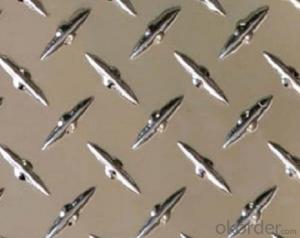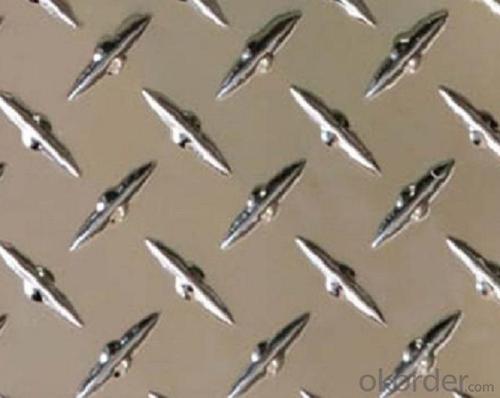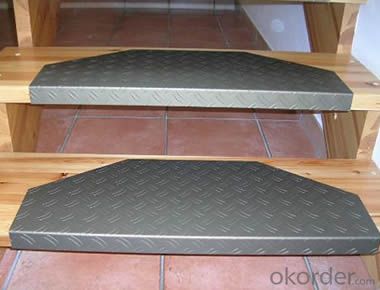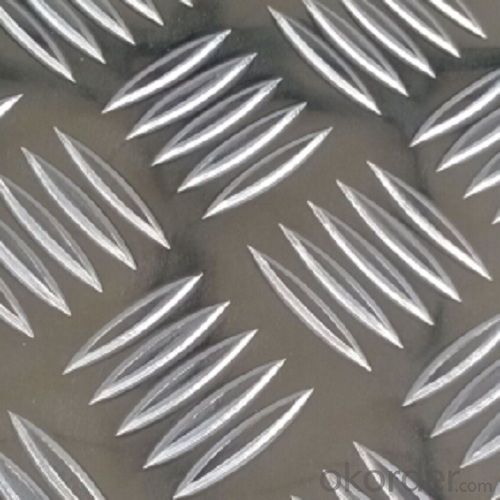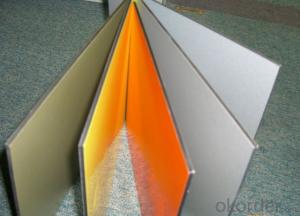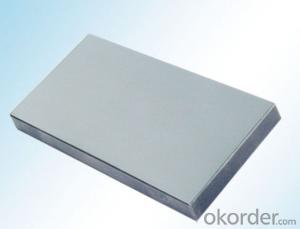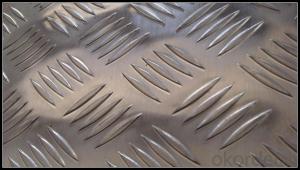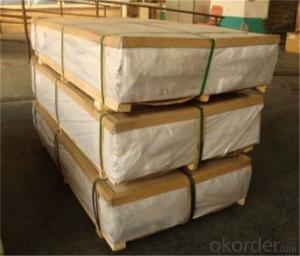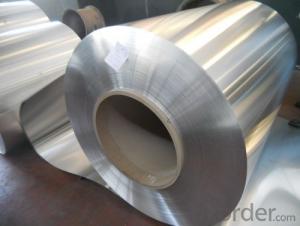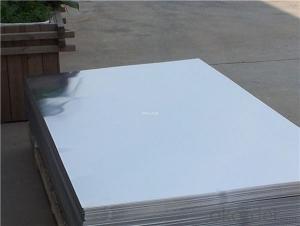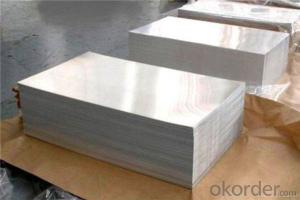Sheets Aluminum - Aluminium Stair Checker Plate 3003 H14 Thickness 2.5mm
- Loading Port:
- Shanghai
- Payment Terms:
- TT OR LC
- Min Order Qty:
- 2.5
- Supply Capability:
- 5000 m.t./month
OKorder Service Pledge
OKorder Financial Service
You Might Also Like
Specification
Aluminium Stair Checker Plate 3003 H14 Thickness 2.5mm
l Product Information:
1) Alloy: 1050, 1200, 1100,, 3003, 5052, 5754
2) Temper: H111, H112, O, H14, H24, H32
3) Thickness: 0.8mm to 10mm
4) Width: 100mm to 2300mm, Length: up to 11 Meter,
5) Patterns:Two bar, three bar, Five bar and diamond plate
6) Use: Refrigeration floor, Truck floor, flooring, stairs, indoor and outdoor decoration
l Packaging & Delivery
Packaging detail: Standard seaworthy exporting carton, Wooden pallets, waterproof paper and plastic coverage or as customer's requirement
Delivery detail: about 20 days from received oiginal L/C or advance payment
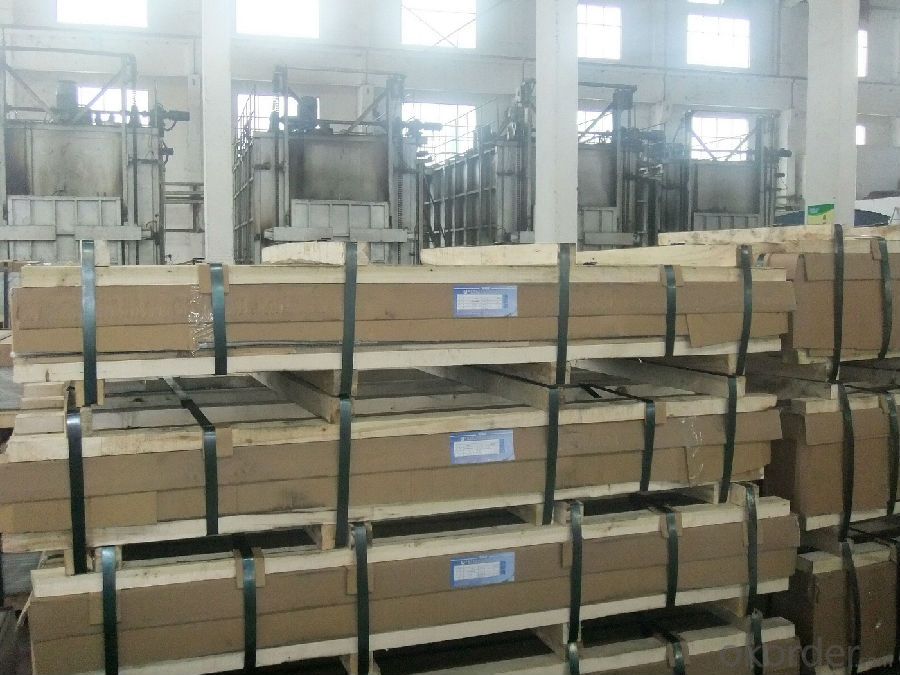
l Company Profile
CNBM International Corporation, China National Building Materials (Group) Corporation, is one of the largest companies in China building material & equipment industry, with 42,800 employees and sales in 2005 of US Dollar 4.395 billion. In 2006, China National Building Material Company Limited was listed on Hong Kong Stock Market with the stock code as 3323. |
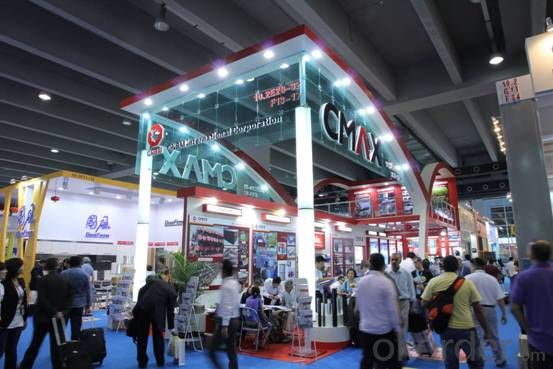
l CNBM World Wide
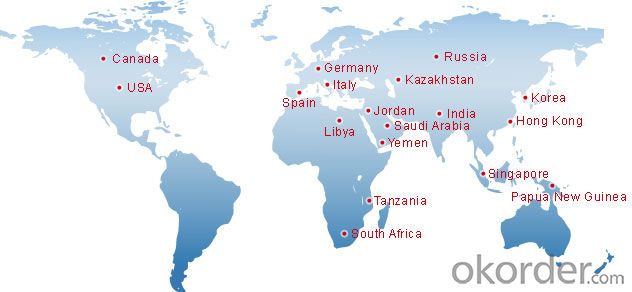
l Product Images
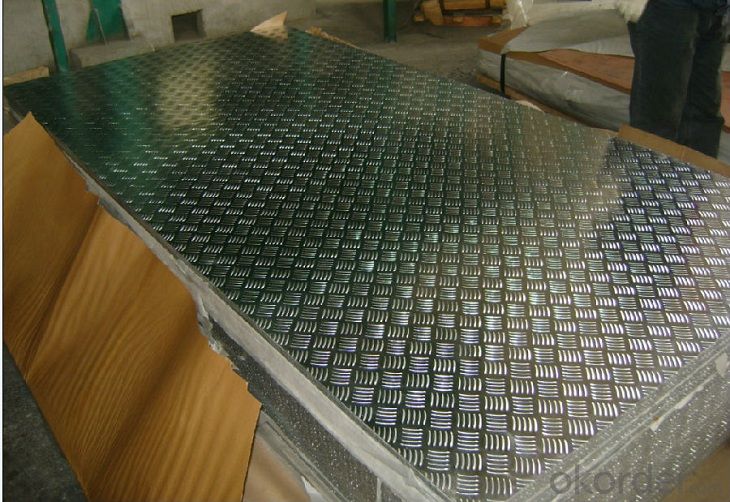
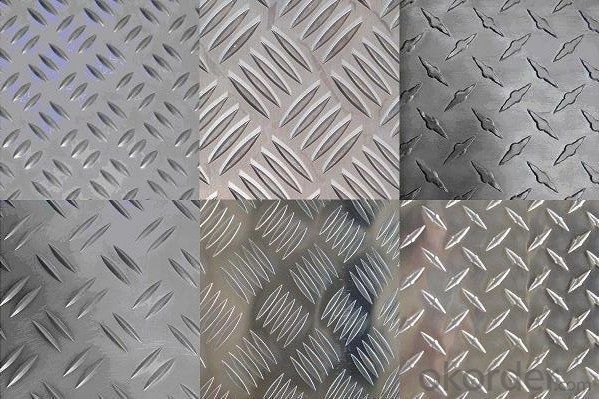
l Certificates
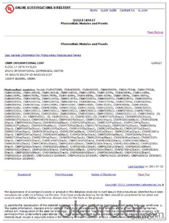
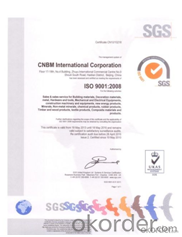
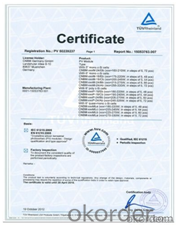
l FAQ
Q: Do you provide free samples?
A: Yes, free samples will be sent to you on freight at destination.
Q: Can I get your latest products catalogue?
A: Yes, it will be sent to you in no time.
Q: What is the MOQ?
A: 2.5 tons
Q: What are your payment terms?
A: We accept L/C, T/T.
- Q: (1) Aluminum is malleable. (2) Aluminum reacts with sulfuric acid.(3) Aluminum conducts an electric current.(4)Aluminum has a density of 2.698 g/cm3 at STP.Explain why.
- oxygen supports combustion is the chemical one
- Q: Can aluminum sheets be an alternative to glass in certain applications?
- Certain applications can consider aluminum sheets as an alternative to glass. Aluminum sheets provide various benefits over glass, making them suitable for specific scenarios. To begin with, aluminum sheets possess lightweight and durable characteristics, making them an excellent choice for industries like aerospace or automotive, where weight is a concern. Conversely, glass is relatively heavy and brittle, limiting its usage in certain environments. Moreover, aluminum sheets exhibit exceptional resistance to corrosion, making them a suitable option for marine or coastal applications, where glass may deteriorate over time due to exposure to saltwater. Aluminum sheets also possess a high strength-to-weight ratio, enabling greater design flexibility and structural integrity compared to glass. Furthermore, aluminum sheets offer superior thermal insulation properties in comparison to glass. They provide improved resistance to heat transfer, which is advantageous in applications where temperature control is crucial, like the construction industry. Additionally, aluminum sheets can be more cost-effective than glass in specific applications. The production and installation costs of aluminum sheets are often lower than glass, making them a more economical choice for large-scale projects. However, it is important to acknowledge that glass retains its own unique properties and advantages, such as transparency and optical clarity. Glass also has better resistance to scratches and chemical corrosion when compared to aluminum sheets. In conclusion, while aluminum sheets can serve as a viable alternative to glass in certain applications due to their lightweight, durability, corrosion resistance, thermal insulation properties, and cost-effectiveness, the final decision between the two materials depends on the specific requirements and limitations of the application at hand.
- Q: What are the different types of surface treatments for aluminum sheets in the marine industry?
- In the marine industry, aluminum sheets are widely used due to their lightweight, corrosion-resistant properties. To enhance the durability and performance of aluminum sheets in marine environments, various surface treatments are employed. These treatments provide an additional layer of protection against corrosion, oxidation, and other forms of wear and tear. Some of the different types of surface treatments for aluminum sheets in the marine industry include: 1. Anodizing: Anodizing is a common surface treatment for aluminum sheets. It involves creating an oxide layer on the surface of the aluminum through an electrochemical process. This oxide layer adds strength, improves corrosion resistance, and can also be dyed to provide aesthetic appeal. 2. Powder coating: Powder coating is a popular method to enhance the appearance and durability of aluminum sheets. It involves applying a dry powder to the surface of the aluminum and then heating it to create a protective coating. Powder coating provides excellent resistance to corrosion, UV rays, and scratches. 3. Chromate conversion coating: Chromate conversion coating, also known as chemical film coating or chromating, involves immersing the aluminum sheets in a solution containing chromate compounds. This process forms a thin layer of chromate conversion coating on the surface, which enhances corrosion resistance and provides a good base for subsequent painting or bonding. 4. Paint coating: Applying a paint coating to aluminum sheets is another surface treatment method in the marine industry. Paint coatings not only enhance the appearance but also provide a protective layer against corrosion, saltwater, and other harsh environmental conditions. Epoxy or polyurethane-based paints are commonly used for marine applications. 5. Mechanical treatments: Mechanical treatments such as brushing, grinding, or polishing can be performed on aluminum sheets to improve their surface finish. These treatments remove impurities, smoothing out any imperfections and enhancing the overall appearance of the aluminum surface. Each of these surface treatments has its own advantages and is chosen based on the specific requirements of the marine application. By selecting the appropriate surface treatment, manufacturers can ensure that aluminum sheets meet the necessary performance and durability standards in the demanding marine industry.
- Q: How could two pieces of aluminium flakes be welded together?
- You can use argon arc welding, connect the positive pole with alternating current,aluminum wire as the welding wire.
- Q: Aluminum is put into copper chloride and how can you tell what happens to them visually?
- This reaction occurs because Al is above Cu in the activity series.Al is oxidized and the copperis reduced. 2 Al^0(s) + 3Cu2+(aq) -- 2 Al3+(aq) + 3 Cu^0(s)
- Q: Can aluminum sheets be used for roof flashing?
- Yes, aluminum sheets can be used for roof flashing. Aluminum is a popular choice for roof flashing due to its durability, corrosion resistance, and lightweight properties. It provides a reliable barrier against water penetration and helps to redirect water away from vulnerable areas on the roof, such as valleys and chimneys. Additionally, aluminum flashing is relatively easy to install and maintain, making it a practical choice for roof flashing purposes.
- Q: On candle when candle flame is about 1.000 degrees celsius and melting point of aluminum is 660 degrees celsius.
- Aluminium is a highly reactive metal and undergoes passivation. Thus, there is a highly non-reactive layer of Al2O3 around any piece of aluminium exposed to oxygen for any length of time. Al2O3 has a melting point of 2000+ degrees celsius, and it provides some amount of insulation to the aluminium below.
- Q: How does aluminum sheet perform in corrosive environments?
- Aluminum sheet performs exceptionally well in corrosive environments due to its inherent corrosion resistance. When exposed to moisture or various chemicals, aluminum forms a protective oxide layer that prevents further corrosion. This makes it a preferred choice for applications where resistance to corrosion is crucial, such as marine environments, chemical processing plants, and outdoor structures.
- Q: Is it possible to apply paint to an aluminum sheet roof after it has been installed?
- <p>Yes, you can paint your aluminum sheet roof after installation. However, it's crucial to ensure the surface is clean and free of any contaminants. Use a primer specifically designed for aluminum to enhance adhesion and durability. Apply a high-quality paint suitable for metal surfaces, following the manufacturer's instructions carefully. This process can help protect the roof from weathering and enhance its appearance, but it's recommended to consult with a professional to ensure the best results and longevity of the paint job.</p>
- Q: Can 101 aluminum sheets be used in electrical or electronic components?
- Yes, 101 aluminum sheets can be used in electrical or electronic components.
Send your message to us
Sheets Aluminum - Aluminium Stair Checker Plate 3003 H14 Thickness 2.5mm
- Loading Port:
- Shanghai
- Payment Terms:
- TT OR LC
- Min Order Qty:
- 2.5
- Supply Capability:
- 5000 m.t./month
OKorder Service Pledge
OKorder Financial Service
Similar products
Hot products
Hot Searches
Related keywords
